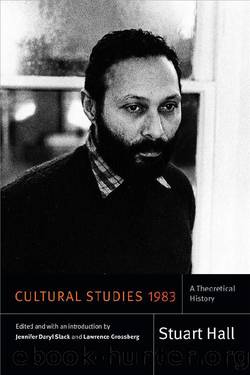Cultural Studies 1983 by Hall Stuart

Author:Hall, Stuart
Language: eng
Format: epub
ISBN: 9780822373650
Publisher: Duke University Press
Published: 2016-09-23T00:00:00+00:00
LECTURE 6
Ideology and Ideological Struggle
In this lecture, I want to rethink the nature of ideology and the possibility of struggle on the ideological terrain. I will approach this task indirectly, by returning to Althusser in order to assess his contribution to the reconceptualisation of ideology. Despite my disagreements, Althusserâs break with classical Marxism opened up a new perspective on the question of ideology and thus made it possible for me to rethink it as well.
Althusserâs critique of ideology follows many of the lines of his critique of general positions in the classical Marxist problematic sketched in the previous lecture. That is to say, he is opposed to class reductionism in ideologyâthe notion that there is some guarantee that the ideological position of a social class will always correspond to its position in the social relations of production. Althusser here is criticising a very important insight which people have taken from The German Ideology (Marx and Engels 1970), the founding text of the classical Marxist theory of ideology: namely, that ruling ideas always correspond to ruling class positions; that the ruling class as a whole has a kind of mind of its own which is located in a particular ideology. The difficulty is that this does not enable us to understand why all the ruling classes we actually know have actually advanced in real historical situations by a variety of different ideologies or by now playing one ideology and then another. Nor does it enable us to understand why there are internal struggles within all the major political formations over the appropriate âideasâ through which the interests of the dominant class are to be secured. Nor does it enable us to understand why, to a significant degree, in many different historical social formations the dominated classes have used âruling ideasâ to interpret and define their interests. To simply describe all of that as the dominant ideology, which unproblematically reproduces itself and which has gone on marching ahead ever since the free market appeared, is an unwarrantable forcing of the notion of an empirical identity between class and ideology which concrete historical analysis denies.
The second target of Althusserâs criticism is the notion of âfalse consciousnessâ which, he argues, assumes that there is one true ascribed ideology per class, and then explains its failure to manifest itself in terms of a screen which falls between subjects and the real relations in which subjects are placed, preventing them from recognising the ideas which they ought to have. That notion of âfalse consciousness,â Althusser says quite rightly, is founded on an empiricist relationship to knowledge. It assumes that social relations give their own, unambiguous knowledge to perceiving, thinking subjects; that there is a transparent relationship between the situations in which subjects are placed and how subjects come to recognise and know about them. Consequently, true knowledge must be subject to a sort of masking, the source of which is very difficult to identify, but which prevents people from ârecognising the real.â In this conception, it
Download
This site does not store any files on its server. We only index and link to content provided by other sites. Please contact the content providers to delete copyright contents if any and email us, we'll remove relevant links or contents immediately.
Kathy Andrews Collection by Kathy Andrews(10510)
The remains of the day by Kazuo Ishiguro(7544)
Spare by Prince Harry The Duke of Sussex(4188)
Paper Towns by Green John(4165)
The Body: A Guide for Occupants by Bill Bryson(3791)
Be in a Treehouse by Pete Nelson(3207)
Harry Potter and the Goblet Of Fire by J.K. Rowling(3026)
Goodbye Paradise(2951)
Never by Ken Follett(2873)
Into Thin Air by Jon Krakauer(2695)
The Remains of the Day by Kazuo Ishiguro(2614)
The Genius of Japanese Carpentry by Azby Brown(2602)
The Cellar by Natasha Preston(2592)
Drawing Shortcuts: Developing Quick Drawing Skills Using Today's Technology by Leggitt Jim(2529)
120 Days of Sodom by Marquis de Sade(2428)
Architecture 101 by Nicole Bridge(2348)
The Man Who Died Twice by Richard Osman(2291)
Machine Learning at Scale with H2O by Gregory Keys | David Whiting(2269)
Fairy Tale by Stephen King(2059)
